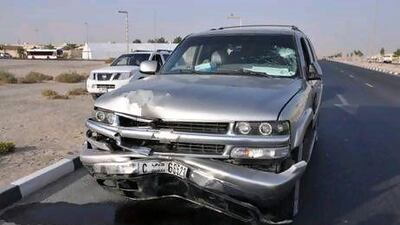DUBAI // Gang fights in Dubai are becoming more bloody because of the increasing use of bladed weapons – and there is still no law against carrying one.
There have been at least three serious outbreaks of gang violence this year. In the latest, last week, two young men were injured and an 18-year-old died when two gangs clashed with knives and swords.
"The fights have not increased but their nature has changed. They have become more serious and bloody due to the heavy use of knives and swords," said Dr Mohammed Murad, general secretary of the Juvenile Care Society in Dubai and director of the Dubai Police decision-making support centre.
"Eliminating the practice of carrying knives is part of the solution to the youth-violence problem."
A law to criminalise the possession of bladed weapons has been under consideration by the Ministry of Justice for more than a year.
"Law enforcement authorities can only implement laws, and cannot hold people accountable without them," Dr Murad said.
"However, they have been trying to work within the framework of the existing laws to combat the practice."
Last week's fight was in retaliation for an earlier fight, for which the two gangs had been referred to public prosecution. That fight also turned bloody because of the use of weapons with sharp blades.
In 2009, 27 knife crimes were reported. A year later that figure rose to 81. Although there was a fall to 60 last year, police say the overall trend remains disturbing. Almost a third of all crimes registered last year involving knives were carried out by people under the age of 18.
Since 2010, Dubai Police have deployed patrols to catch youngsters with bladed weapons after a 13-year-old boy was stabbed to death of by a group of teenagers outside his home in Rashidiya.
When young people are caught with knives and swords, their parents are told to sign an agreement pledging that it will not happen again. If it does, the young person will be referred to public prosecution and may be charged with planning to commit a crime.
But spreading awareness among young people of the dangerous consequences of carrying such weapons is a more effective tool, Dr Murad said.
Among the other causes he identified for youth fights was the lack of parental supervision and a shift in loyalty from family to friends in gangs, despite their demands for illegal activity.
Young people also learn violent behaviour from their community, their peers and sometimes from TV or social media, according to Ahmad Alomosh, professor of applied sociology and criminology at the University of Sharjah.
Sometimes, he said, young people have not received adequate attention and care from their families.
"Also, they suffer from low self-esteem," he said.
Young people who are at risk of violent behaviour need more attention from their family and their school, he said.
Parental supervision topped the causes of gang violence listed by Hussein Al Shawab, director of the social protection department at the Ministry of Social Affairs, which supervises several juvenile centres.
Mr Al Shawab described youth violence as a problem, but not a trend. "The majority of the juvenile crimes cases we have are for minor thefts and traffic offences, while those who are brought in for violent attacks are the last on the list.
"However, from my experience, it is an existing problem in society that needs to be addressed.
"Parental supervision of teenagers is vital, and when not practised, it can have drastic consequences on the children."
He said the problem was aggravated by the negative impact on children of violent video games and films.
Engaging young people in positive activities during their free time is the key to eliminating the problem, and this should be a joint effort between the family and the concerned authorities, he said.
"More work should be put in to engage the youth in sports clubs, educational and entertainment programmes that are of interest for them."
* Additional reporting by Vivian Nereim

